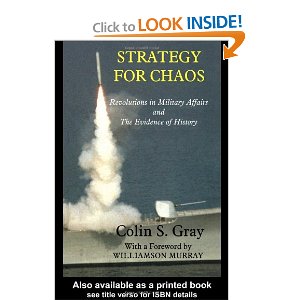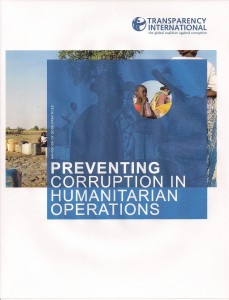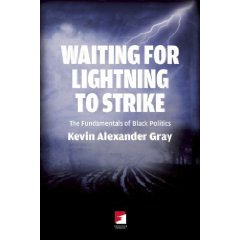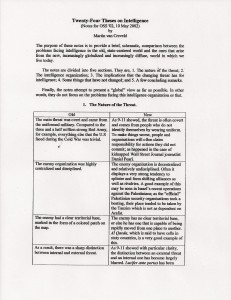 Brilliant Tour, New Knowledge, Best in Class & Practical,June 19, 2009
Brilliant Tour, New Knowledge, Best in Class & Practical,June 19, 2009
Colin Gray
For those who have not already digested the author's seminal publication, Modern Strategy, I have a summative review there that could be helpful in conjunction with appreciating this new work.
10 pages of notes–this is a major work that is also easily grasped by undergraduates and graduates. I want to say up front that I have seen no finer overview that blends the original thinking of the author, himself a master strategist, with broad consideration of the work of others, and very disciplined integration of selected quotes and ample citations. The notes are superb.
My summary notes first:
Six lessons of Bush-Cheney era:
01–Bush era did not lack for brains or judgment, simply suspended intelligence in favor of “hopes, dreams, and good intentions.”
02–Crusades inconsistent with reality will fail
03–US forces not trained, equipped, organized for counterinsurgency
04–Transition to peace is harder than winning war
05–International politics is real and will not go away
06–Beware capabilities-driven strategy.
Three levels of strategic thinking:
–general
–general applied to regular or irregular warfare
–tailored to a specific “episode” e.g. Haiti, Somalia, Iraq
US starts with multiple handicaps:
01–cultural disposition to look at pieces, not the whole
02–flawed theory of deterrence
03–excessive faith in technology, insufficient grasp of human factors, incompetence at irregular war
04–one size fits all military does not suit diversity of challenges
05–lack of authority among those we seek to influence
06–barriers between military and political leaders (and lack of inter-agency coherence at any level)
“Deterrence…is not a fixed, settled, and now long-perfected product.” [It is] not understood, illusions abound, and it [a theory of] is desperately needed as a companion to the concepts of prevention and pre-emption. This is the first time I encounter a concise well-organized critique of the entire field of deterrence. He cites Payne in noting how the US tried to “deter” NVN with a Rolling Thunder air campaign, despite having no clue “about the enemy's policymaking process or how he rank-ordered his values.”
Key recommendations:
01–Deterrence must be part of broader strategy of influence in all its forms
02–We must take the ideas and perceptions of others seriously
03–Citing Metz & Mullen, “the age of the stupid enemy is past.”
Quoting Echeverria: “American way of battle has not yet matured into a way of war.” Later in the chapter on Irregular Warfare he observes, citing others as appropriate, that war is the whole enchilada–political, legal, social, economic, military, cultural; while warfare is the conduct of the war, predominantly but not exclusively military.
The chapter on surprise is original, lacking only one fundamental: intelligence must cast a wide net and policy must keep an open mind.
The chapter on revolutionary change is original but overlooks O'Hanlon's Technological Change and the Future of Warfare and does not address the broad literature on the need to reinvent intelligence and shift from secret unilateral to open multinational.
I learn that context is both that which surrounds, and that which weaves together; throughout the book the author emphasizes the importance of Gestalt, of “the whole,” with particular attention to the political consequences of military actions.
Citing Field Marshall Keitel: errors in tactics and operations can be corrected in the current war, errors in strategy can only be corrected in the next.
Quoting Gray:
p. 108: “Strategic surprise on the greatest of scales occurs as a result of changes in the contexts for national security.” He goes on to note that political surprise is what catches the US most unawares, in part because the US separates policy and politics from all else.
p. 119 “War is about peace…above all else, war is about the kind of peace that should follow.”
Essence of strategy:
01–About the use of force for political effect
02–About relationship between means and ends
03–Politics must rule BUT politicians must hear, understand, and respect the military
American “way of war (more properly, way of battle):
01–Apolitical (I would add, amoral)
02–Astrategic
03–Ahistorical
04–Problem-sovling, optimistic
05–Culturally-challenged
06–Technology-dependent
07–Focused on Firepower
08–Large-scale
09–Aggressive-Offensive
10–Profoundly-Regular
11–Impatient
12–Logistically-Excellent
13–Highly-Sensitive to Casualties
Irregular Warfare demands:
01–Protect-the-People
02–Intelligence-is-king
03–Ideology-matters
04–Enemy-not-the-main-target
05–Unity-of-effort (I add, Whole of Government, M4IS2)
06–Culture-is-crucial
07–No-sanctuaries
08–Time-is-a-weapon
09–Undercut-enemy-POLITICALLY
The author is deeply respectful of our soldiers, lamenting that they are victims of a strategic deficit among both our politicians and senior military leaders, hence sent in harm's way ill-advisedly to few good ends.
The author provides new thinking on pre-emptive and preventive war, stating on page 242 that both are “only feasible if intelligence is immaculate.” This chapter may be the most important chapter as well as the most difficult for conventional decision-makers, both political and military, to grasp, given their “closed circle” circumstances.
The concluding chapter on The Merit in Ethical Realism is absorbing and feels a huge gap in current US strategic thinking. Three quotes capture my admiration for this author and this chapter:
“…it is nearly always inexpedient to ignore or affront the ethical sensibilities of stakeholder communities, including one's own.”
“As a practicing strategist, I am convinced that strategy's ethical dimension is not subjectively irrelevant; rather it is integral to supposedly objective analysis, calculation, decision, and behavior.”
“The moral is strategic, and the strategic is moral.”
The author concludes that we cannot think in terms of one “Master Menace,” and must instead be prepared for a diversity of challenges and dilemmas. In my comment below I provide URLs for summary articles about the Army's Strategic Conferences in 1998 and 2008, both ignored by all “deciders.”
I encourage readers to buy this book, and to see my reviews of the books linked to below.
The Fifty-Year Wound: How America's Cold War Victory Has Shaped Our World
Breaking the Real Axis of Evil: How to Oust the World's Last Dictators by 2025
Wars of Blood and Faith: The Conflicts That Will Shape the 21st Century
A More Secure World: Our Shared Responsibility–Report of the Secretary-General's High-level Panel on Threats, Challenges and Change
The Unconquerable World: Power, Nonviolence and the Will of the People
Election 2008: Lipstick on the Pig (Substance of Governance; Legitimate Grievances; Candidates on the Issues; Balanced Budget 101; Call to Arms: Fund We Not Them; Annotated Bibliography)
The New Craft of Intelligence: Personal, Public, & Political–Citizen's Action Handbook for Fighting Terrorism, Genocide, Disease, Toxic Bombs, & Corruption
Collective Intelligence: Creating a Prosperous World at Peace
See images posted above and comment below. Colin Gray is a global treasure, would that those in power had the humility to attend to his wisdom.











